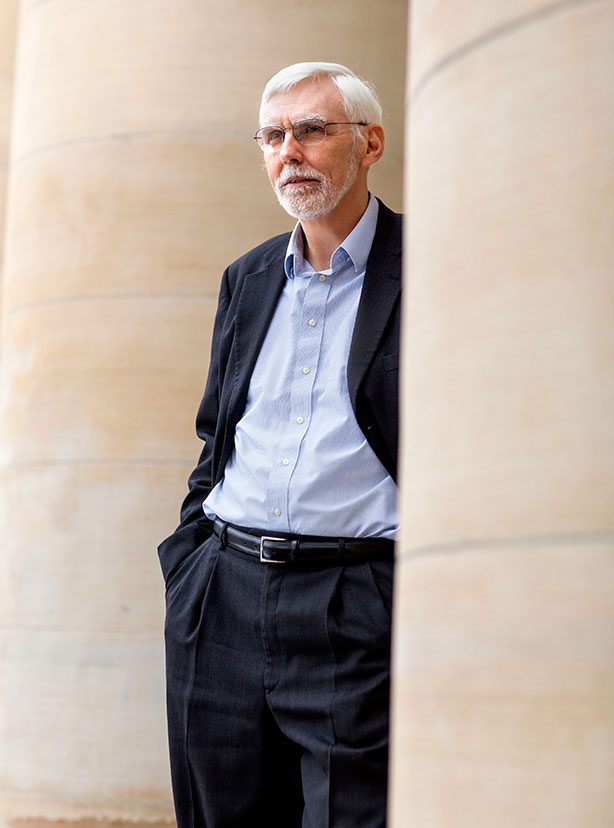PEOPLE

After a decade as dean, Arts and Sciences' Peter Lepage returns to the classroom
Being dean of the College of Arts and Sciences for the past 10 years has been a mixed blessing for Peter Lepage. On one hand, he thoroughly enjoys his daily interactions with faculty, students and alumni, learning why they are passionate about their classes, research, careers and projects.
On the other hand, he always feels a twinge of jealousy when speaking with a professor who is excited about her latest discovery or thrilled that his students are eager to dig into an assignment. He's ready to have those experiences again, too.
Come July, he'll join those professors when he leaves the dean's office after two terms and returns to his teaching and research in Cornell's Department of Physics. Gretchen Ritter '83, professor of government and vice provost at the University of Texas, has been named dean and will begin her appointment Aug. 1.
"Peter has been an exceptional dean and campus leader," says Provost Kent Fuchs. "Many of his efforts have helped the university as a whole, such as the faculty renewal initiative for which he's been a front-and-center advocate."
Scott McDonald, professor of philosophy and the Norma K. Regan Professor in Christian Studies, agrees and adds: "Peter has been a passionate defender of and advocate for the College of Arts and Sciences during a challenging period in its history."
Lepage says much of his time is spent making sure the work of the office is running smoothly. "Doing that well – making principled decisions in a consistent and timely way, each day – is critical to successful leadership. But another part is gathering information about the college, developing an internal model that helps you build a strategy for where to go next," he says.
Collecting that information has clearly been one of the best parts of the job for Lepage, who grabs his daily coffee at the Temple of Zeus in Goldwin Smith Hall, chatting with student cashiers and faculty members. Or who makes a point of asking surprised students about their major or their favorite classes when they encounter him, still in suit and tie, during one of his weekday hikes on the gorge paths.
About 40 percent of Lepage's time as dean is spent with alumni, who share their thoughts about the college, but also talk about their career paths or Cornell experiences that changed their lives.
All these discussions have led him to an even greater appreciation of the benefits of a broad liberal arts education – one he says he didn't fully realize himself as a physics major at McGill University and then as a Stanford University graduate student.
Because he chose his major as a freshman, Lepage was entrenched in the lab from his first days on the McGill campus. But on bus trips home, he expanded his horizons by reading voraciously.
Breadth of intellectual experience is what makes a degree from the College of Arts and Sciences so enriching for students, many of whom spend the first two years sampling different majors, then discover a passion and dive in deeply, he says.
Lepage's priorities as dean have been to support that experience for students by filling positions created by retiring faculty, increasing resources for the advising department and maintaining excellence in teaching and research.
"I was constantly amazed by Peter's ability to keep a close eye on both the big picture (the college's future) and the important details (needs and concerns of individuals)," says Elizabeth Adkins-Regan, professor of psychology and neurobiology and behavior, "and by the principled and effective way he solved problems both large and small. His leadership was exceptional."
The College of Arts and Sciences provides foundation and advanced courses for students throughout the university. In fact, only one member of the Class of 2012 hadn't taken at least one class in the college. In 2011-12, more than one-fourth of all Cornell undergraduates received their degree from Arts and Sciences, while 34 percent of students receiving doctoral degrees from the Graduate School were advised by faculty within the college.
"After 10 years, I can truly say that the arts college is the heart of the university," Lepage says. "The whole structure is about inviting students to challenge themselves to the greatest extent possible to gain the self-knowledge, self-confidence and skills required to tackle a variety of hard projects and pull them off well and on time."
"That is an absolutely spectacular boot-camp experience for life."
Highlights of Peter Lepage's two terms as dean
|
Kathy Hovis is a writer for the College of Arts and Sciences.